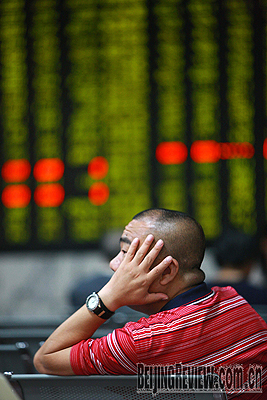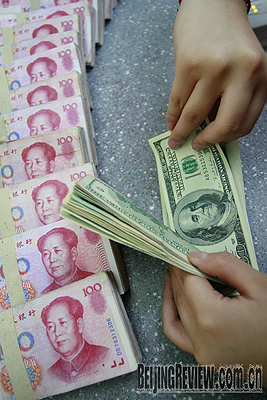|
1. Four-trillion-yuan Stimulus Package Created
China put in place a massive fiscal stimulus plan in 2008 worth approximately 4 trillion yuan ($586 billion) to boost domestic demand and spur the slowing economy.
The plan was approved on November 5 at an executive meeting of the State Council presided over by Premier Wen Jiabao.
According to the plan, the government has pinpointed 10 areas in which to spend the money from now until 2010 to maintain economic growth. They include infrastructure, social welfare, eco-environmental improvements, post-earthquake reconstruction and income increases for urban and rural residents, especially for low-income groups.
Over the next two years, the Central Government will spend a total of 1.18 trillion yuan ($172.8 billion) and obtain additional funds from local governments and other sources to boost the overall economy.
2. Monetary Policy Changed
The government adopted an "appropriately accommodative" monetary policy in 2008, a switch from its previous monetary tightening one.
An executive meeting of the State Council announced the change on November 5.
The central bank had previously adhered to a tightened monetary policy to combat runaway inflation and prevent the economy from overheating.
But when the U.S. credit crunch occurred and created ripples throughout the world, almost all of China's economic indicators pointed to tough times ahead for the country.
On September 16, the central bank cut interest rates for the first time in more than six years and lowered the reserve requirement ratio for small banks. The surprise move was widely interpreted as a decisive shift by the government toward an easing of the monetary environment.
The central bank had cut interest rates five times since September and lowered the reserve requirement ratio four times.
3. Stock Market Entered a Bear Run

The mainland stock markets turned bearish in 2008, with the benchmark Shanghai Composite Index plummeting about 64 percent from 5,265 points on January 2, 2008, to around 2,000 points at the end of the year, making it one of the worst performing stock markets in the world.
The stock markets had been going downhill for more than half a year, defying all remedial policies such as a reduction in the stamp tax on share purchases and sales, and five interest rate cuts.
The government further demonstrated its promise to boost investor confidence by ordering its investment arm, Central Huijin Investment Co. Ltd., to purchase shares in the open markets. It also encouraged listed state-owned enterprises to buy back their own shares to stop the markets from crumbling. But by the end of the year, there was no indication that these efforts were paying off.
4. Rescuing the Property Market
Affected by the global credit crunch, mainland property prices started falling dramatically at the end of 2008 especially in metropolises such as Shenzhen and Guangzhou where home prices had surged in 2007.
The government, which suppressed property prices in 2007, acted quickly to prop up the property market by loosening controls on loans for developers and adopting a series of measures to encourage individuals to buy homes.
Meanwhile, the government vowed to build more affordable and low-rent homes and revamp deteriorating shelters. It also said it would expand a pilot program to rebuild rural housing.
At a meeting in December, the State Council issued more detailed measures, including: allowing second home purchasers to enjoy favorable loan rates; eliminating the sales tax on individual home sales; issuing loans and providing financing-related services to developers for reasonable expansion purposes; and eliminating the urban land tax, according to legal procedures.
5. Yuan Hit Record High

China's currency, the yuan, continued to appreciate against the U.S. dollar in 2008.
The central parity rate of the yuan on December 23 was 6.8389 yuan to 1 dollar, marking a 6.74-percent growth of the Chinese currency since the beginning of the year.
The yuan has appreciated more than 18 percent since it was freed from a peg to the dollar in July 2005.
The yuan strengthened fast in the first half of the year due to a weakening dollar amid worries about the U.S. financial regime. It hit a record high of 6.8009 yuan to 1 dollar on September 23.
But in the following months the yuan lost some of its value as the greenback grew stronger during the global financial storm. Investors snapped up low-risk dollar-denominated assets. Besides this, tanking international oil prices also injected steam into the dollar.
6. Overseas Investments Suffer Huge Losses
The tumbling global financial markets took a toll on China's overseas investments. China Investment Corp., which is responsible for investing $200 billion of the country's foreign reserves, suffered a book loss of more than 80 percent from its $3 billion purchase of Blackstone Group LP shares and lost another $4 billion from its investment in Morgan Stanley.
China's qualified domestic institutional investor (QDII) program had also seen the value of its funds plummet nearly 60 percent after they started investing in foreign companies in 2007.
| 